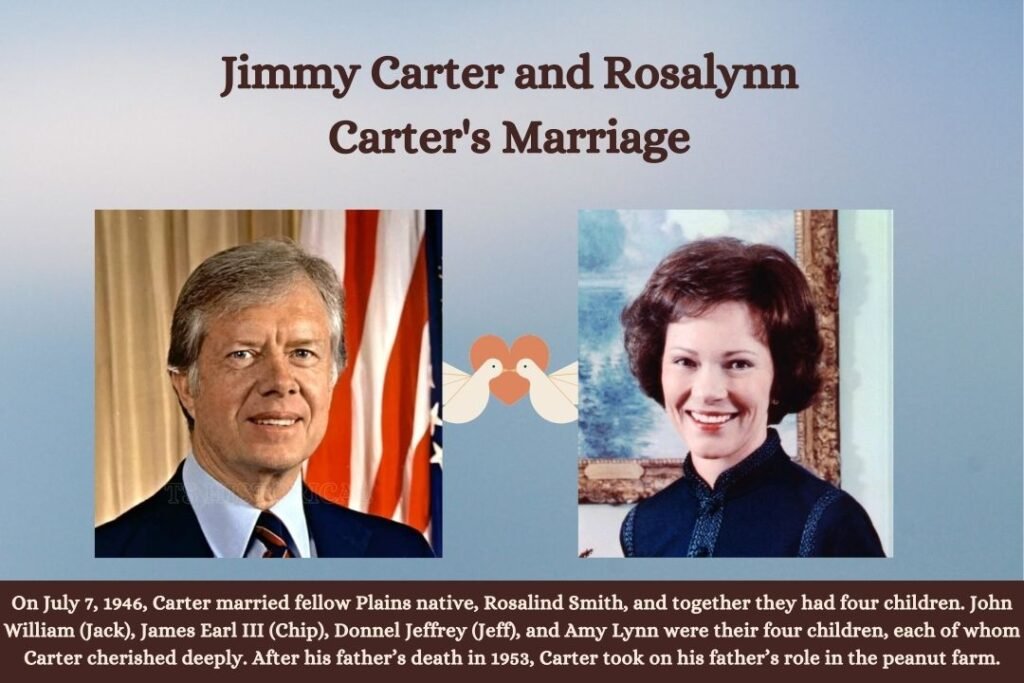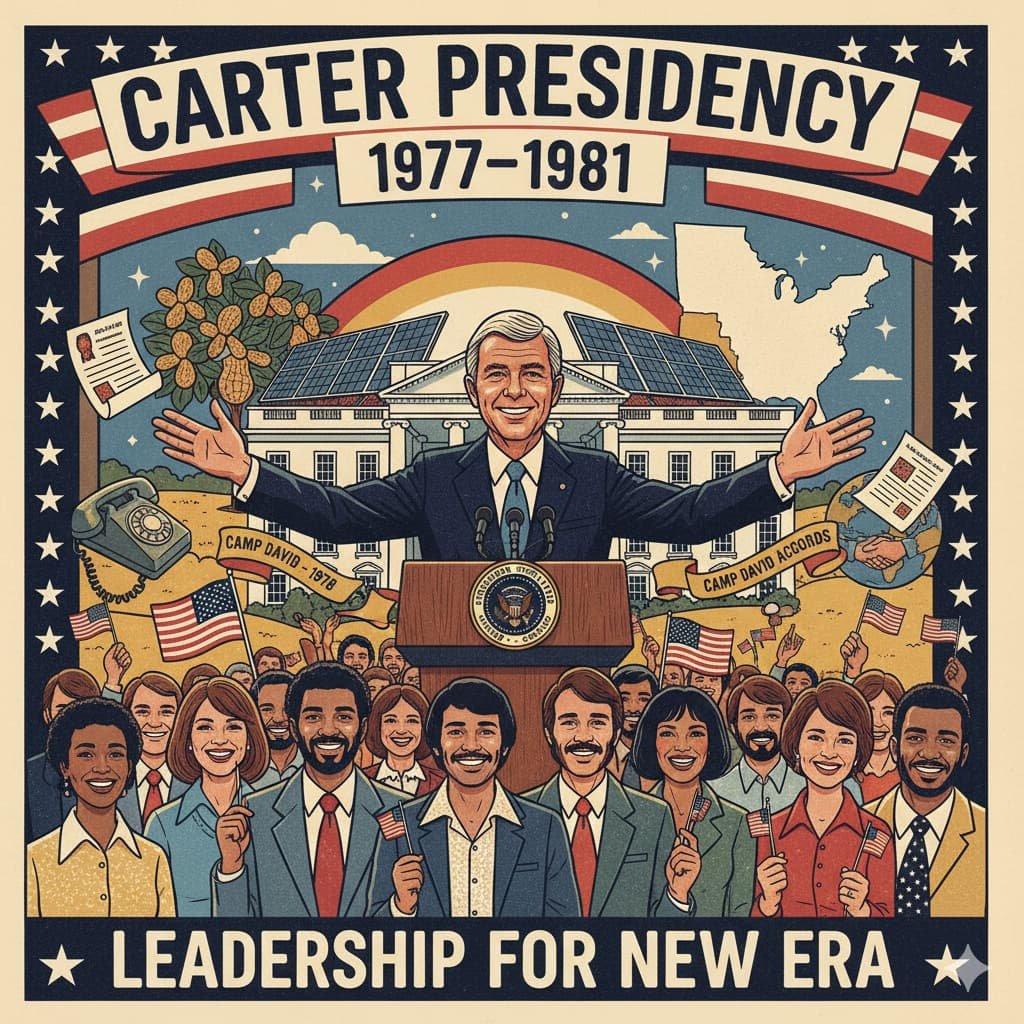Table of Content
Jimmy Carter’s Early Life
Childhood & Family
James Earl Carter Jr. was born on October 1st, 1924, in Plains, Georgia, a small southern town of just a few hundred—was a significant figure in the List of U.S. Presidents as the 39th President. Donnel Carter was the eldest son of James Sr., a well-to-do peanut farmer, and Lillian Gordy Carter, a successful nurse. Raised on their farm alongside his siblings, Gloria, Ruth, and Billy, Jimmy devoted himself to the family peanut business through the lean years of the Great Depression.
Jimmy Carter Facts

| Born | October 1, 1924, in Plains, Georgia, United States |
| Death | September 2025, and he is the oldest living U.S. president in history |
| Wife | Rosalynn Carter |
| Parents | James Earl Carter Sr > Bessie Lillian Gordy Carter |
| Children | John William “Jack” Carter > James Earl “Chip” Carter III > Donnel Jeffrey Carter > Amy Lynn Carter |
Jimmy Carter’s Marriage & Children

On July 7, 1946, Carter married fellow Plains native Rosalind Smith, and together they had four children. John William (Jack), James Earl III (Chip), Donnel Jeffrey (Jeff), and Amy Lynn were their four children, each of whom Carter cherished deeply. After his father died in 1953, Carter took on his father’s role in the peanut farm.
Entry into Politics
Before long, Jimmy Carter would feel the call of public service. In 1962, Carter won a seat in the Georgia State Senate. He soon set his sights on the office of governor, fighting through two difficult campaigns before he was finally sworn in on January 12, 1971. Publicly denouncing segregation, Carter became the face of the new South.
Presidential Campaign

Road to the 1976 Election
On December 12, 1974, he announced his candidacy for president. Carter began as a relative unknown in a crowded race. There was a major headline on the editorial page of the Atlanta Constitution that said, Jimmy Carter is running for what? But with his rigorous campaign schedule and down-to-earth persona, Carter handily won the Democratic nomination.
Victory over Gerald Ford
On November 2nd, 1976, Carter and running mate Walter F. Mondale defeated incumbent Gerald Ford in the race for president.
Download this Article in PDF Format
Get a well-documented version of this article for offline reading or archiving.
Download Now (2.4 MB)Presidency
Domestic Policy: Energy Crisis
Jimmy Carter inherited the reins of a nation, still recovering from the tumult of an exhausting, war-torn decade. Carter focused his domestic efforts on energy. We now believe that early in the 1980s, the world will be demanding more oil than it can produce. In 1979, an oil shortage threw the country into a massive energy crisis. As drivers lined up for blocks in the summer heat to fill their gas tanks, Carter called on Americans to scale back their individual consumption. Every act of energy conservation like this is more than just common sense. I tell you, it is an act of patriotism.
Foreign Policy: Camp David Accords
Jimmy Carter approached his foreign policy with forceful optimism. He avoided military escalation, favoring a calm, diplomatic approach instead. This belief system played a crucial role in securing Carter’s greatest diplomatic accomplishment in office. A treaty between Egypt and Israel. Following the 1973 Yom Kippur War, Egyptian President Anwar Sadat sought the help of the United States in negotiating peace with Israel.
Over 13 tense days in September 1978, Carter hosted Sadat and Israeli Prime Minister Menachem Begin at Camp David. The resulting treaty marked a seismic change in the Middle East, securing a peace many had seen as unattainable. And I would like to say, as a Christian, to these two friends of mine, the words of Jesus, Blessed are the peacemakers, for they shall be the children of God.
Iran Hostage Crisis
The darkest days of Carter’s presidency occurred during the Iran hostage crisis. December 4th, 1979, an armed group of Iranian radicals stormed the U.S. embassy in Tahran, demanding that the U.S. extradite the deposed Shah to stand trial at home. The radicals claimed 66 Americans as their hostages. The standoff captured the attention of the world and lasted a remarkable 444 days.
The events culminated in a botched rescue mission in which eight American servicemen and one Iranian civilian were killed. The disastrous ordeal cast a heavy shadow on Carter’s presidency, one that he was unable to shake during his re-election campaign.
Post-Presidency

Carter Center
On November 4th, 1980, Republican Ronald Reagan defeated Carter in the race for president. Carter committed himself to peacemaking throughout his political career. But it was after leaving office that his hands-on humanitarianism left a truly lasting impact. Founded in 1982, the Carter Center has achieved considerable success in its philanthropic endeavors, playing a pivotal role in monitoring elections in numerous emerging democracies.
Nobel Peace Prize
Jimmy Carter has assisted in negotiations to mediate conflicts around the world. His organization has also led efforts to eradicate disease in developing countries and established the groundwork for local public health systems. In 2002, after decades of groundbreaking work, Jimmy Carter was awarded the Nobel Peace Prize.
Later Years & Legacy
Moving back home with Rosalind to Plains, Georgia, Carter lived out his final years devoted to the same ideals he had grown up with. Family, community, and peace. These are not just my goals, and they will not be my accomplishments, but the affirmation of our nation’s continuing moral strength and our belief in an undiminished, ever-expanding American dream.
Explore: Donnel Carter Biography
People Also Ask?
When did Jimmy Carter die?
Jimmy Carter, the 39th President of the United States, passed away peacefully on December 29, 2024, at his home in Plains, Georgia, at the age of 100. He was the longest-lived U.S. president in history and had been in hospice care since February 2023.
What is Jimmy Carter’s status nowadays (as of September 2025)?
Jimmy Carter passed away on December 29, 2024, so as of September 21, 2025, he is no longer alive.
Who are Jimmy Carter’s children?
Jimmy Carter and his late wife, Rosalynn Carter (who passed away in November 2023), had four children: three sons and one daughter.
Sources / References
- Jimmy Carter Presidential Library
- Carter Center – Official Website
- The White House Archives – Jimmy Carter
- New York Times Archives on Carter Family
Discover more from TS HISTORICAL
Subscribe to get the latest posts sent to your email.
